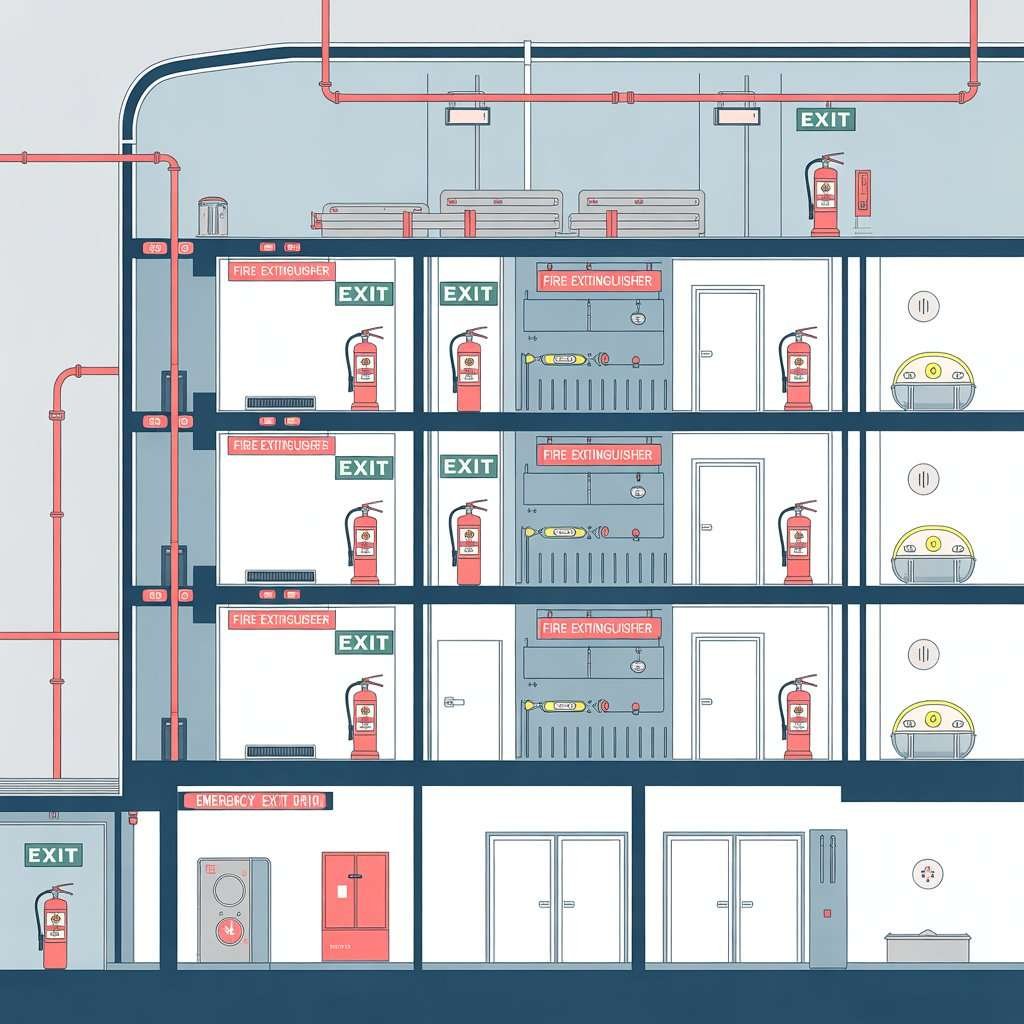Modern buildings are becoming smarter, safer, and more energy-efficient than ever before. A major reason behind this advancement is the integration of ELV systems. These systems work alongside basic electrical and electronics engineering, helping facilities operate smoothly while enhancing convenience, safety, and communication.
In today’s rapidly evolving engineering landscape, ELV (Extra Low Voltage) solutions are essential for commercial buildings, industrial facilities, hospitals, residential complexes, and smart infrastructure. Whether you consult with electrical power engineering consultants, rely on electrical consultancy services, or partner with power engineering consultants, ELV systems remain the backbone of modern building technology.
Understanding ELV Systems in Buildings (With Basic Electrical and Electronics Engineering Insight)
ELV stands for Extra Low Voltage, referring to systems operating at voltages below 50V AC or 120V DC. These systems handle sensitive communication, data, and control tasks that do not require high electrical loads.
ELV integrates smoothly with basic electrical and electronics engineering, allowing engineers to design safe, reliable, and energy-efficient building environments.
Common ELV systems include:
- Fire alarm and detection systems
- CCTV surveillance systems
- Access control and biometric systems
- Public address (PA) and voice evacuation systems
- Data, networking, and structured cabling
- Building management systems (BMS)
- Audio-visual systems
- IP telephony and communication systems
- Intruder alarms and security systems
- Smart home automation
Each system supports the building’s safety, communication, and automation capabilities, making ELV critical to modern engineering design.
Why ELV Systems Are Essential in Modern Buildings
ELV systems are now mandatory in commercial and industrial infrastructure. They help optimize building performance, reduce risks, and improve user experience.
Here’s why ELV systems are crucial:
1. Enhance Safety and Security
With growing security needs, ELV systems like CCTV, access control, and fire alarms ensure real-time monitoring and instant incident response.
2. Improve Operational Efficiency
BMS and automation reduce the workload on maintenance staff and lower operational errors.
3. Enable Smart Communication
Structured cabling and IP telephony keep communication smooth, fast, and reliable.
4. Reduce Power Consumption
ELV technologies consume minimal power, supporting energy-efficient building planning and sustainability.
5. Ensure Regulatory Compliance
Many buildings must follow fire, safety, and communication standards. ELV systems help meet these requirements.
How ELV Systems Integrate with Electrical Consultancy Services
Professional engineering firms and electrical consultancy services play a major role in planning and deploying ELV systems. Their expertise ensures the systems are designed as per global standards such as:
- ISO/IEC 11801 for structured cabling
- NFPA standards for fire alarm systems
- BICSI guidelines for low-voltage infrastructure
This is where electrical power engineering consultants and power engineering consultants contribute significantly. Their planning ensures seamless integration with the building’s primary electrical infrastructure.
Major Components of ELV Systems in Buildings
To understand ELV’s importance, let’s explore its key components:
1. Fire Alarm & Life Safety Systems
Fire alarms detect smoke, heat, or fire and trigger alerts, ensuring occupant safety. These are essential in hospitals, malls, offices, and residences.
2. CCTV Surveillance Systems
CCTV helps in preventing theft, monitoring activities, and enabling evidence collection.
3. Access Control Systems
These systems improve security by controlling who enters restricted zones. Includes:
- RFID card readers
- Biometric scanners
- Smart locks
4. Structured Cabling & Data Networks
These support the building’s communication network, Wi-Fi, IP cameras, and IT infrastructure.
5. Public Address (PA) Systems
Used for announcements, emergency alerts, and communication in large buildings.
6. Building Management System (BMS)
BMS controls and monitors HVAC, lighting, security, and energy usage.
7. Audio-Visual Systems
Conference rooms, auditoriums, and smart classrooms use AV systems for connectivity and productivity.
The Role of Basic Electrical and Electronics Engineering in ELV Design
ELV engineering is deeply connected with basic electrical and electronics engineering principles. These principles allow engineers to understand current flow, voltage, circuits, network design, load management, and system safety.
How electrical engineering supports ELV:
- Designing safe wiring layouts
- Ensuring proper grounding and isolation
- Calculating load distribution
- Integrating ELV within main electrical systems
- Maintaining signal integrity
This is why collaboration between electrical engineers, consultants, and ELV experts is essential in any project.
Benefits of ELV Systems in Buildings
ELV systems offer numerous advantages to property owners, facility managers, and users.
1. Increased Safety
Fire alarms, emergency lighting, and surveillance systems protect lives and assets.
2. Centralized Control
Automation and monitoring systems allow operators to control everything from a single dashboard.
3. Increased Property Value
Smart buildings attract higher rental value and better market demand.
4. Cost Savings
Automation helps reduce energy waste, saving electricity costs.
5. Better Communication and Connectivity
Structured cabling ensures uninterrupted communication across all building areas.
6. Enhanced Productivity
Workers feel safer, and building operations run more efficiently.
Importance of ELV Systems in Smart Buildings and IoT
Smart buildings are powered by IoT devices, sensors, and automated ELV systems. They enhance:
- Energy efficiency
- Comfort
- Security
- Real-time data insights
Due to IoT growth, ELV systems are becoming central to digital infrastructure.
How Electrical Power Engineering Consultants Support ELV Deployments
Electrical power engineering consultants ensure smooth integration of ELV with high-voltage electrical systems. They help with:
- Load analysis
- Safety assessments
- Cable management
- Circuit protection
- Regulatory compliance
- Coordination with civil, mechanical, and IT teams
Their support ensures the entire building operates seamlessly.
Best Practices for Designing ELV Systems in Buildings
Follow these essentials:
- Use structured cabling
- Design modular and scalable systems
- Prioritize cybersecurity for IP-based systems
- Maintain proper documentation
- Choose high-quality hardware
- Follow international standards
- Ensure regular maintenance
Authoritative External References (2–3 Sources)
- National Fire Protection Association (NFPA): www.nfpa.org
- International Electrotechnical Commission (IEC): www.iec.ch
- BICSI Learning Center: www.bicsi.org
FAQs About Basic Electrical Engineering Guide
1. What is the ELV system in a building?
ELV (Extra Low Voltage) refers to systems operating at low voltage for safety, communication, automation, and security. Examples include CCTV, fire alarms, data cabling, and access control systems.
2. What are the benefits of ELV projects?
ELV projects improve building safety, energy efficiency, automation, communication, and operational reliability. They also help reduce costs through efficient monitoring and reduce power consumption.
3. What are the three types of ELV systems?
The three major types are:
- Life Safety Systems (fire alarm, emergency lighting)
- Security Systems (CCTV, access control)
- Communication & Automation Systems (BMS, data cabling, PA systems)
Conclusion
ELV systems are now essential in every modern building. They improve safety, enhance communication, support automation, and contribute to smart infrastructure development. Whether you are constructing a new facility or upgrading an existing one, integrating well-designed ELV systems ensures long-term performance and safety.
If you need expert support in planning, designing, or deploying ELV solutions, JD Engineering delivers complete electrical consultancy services, ELV solutions, and engineering support that ensure your project runs smoothly from concept to commissioning.






